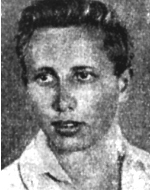Virachovsky (Eilon), Bilu
Son of Malka and father, was born on October 19, 1930 in Tel Aviv. As he grew older, his main lines of character began to appear: stiffness of the neck, strong willpower and scholastic talents. The family lives in the Kadouri School, at the foot of Mount Tabor. His father was the farm principal at the agricultural school, and Bilu attended schools in a children’s village and in Balfouria and later in Ginnegar. When he was 16 years old, he was accepted to the Kadouri School for Agricultural Studies and, thanks to his academic excellence, earned him a scholarship. With the outbreak of the War of Independence, his class enlisted in the Palmach, and Bilu, 17, joined the Yiftach Brigade, fought in Mishmar Ha’emek, Acre, Malkia, and was wounded twice in battle. Was killed on an isolated post after all his comrades fell, and a serious wounded man reached his base six kilometers away despite a strong enemy fire that covered the road. Although he was severely wounded from among the kings, he rejoined his unit before he recovered completely from his wounds. His unit moved to the Negev. His letters from there were full of admiration. “… A plumber like Claudermilk and a simple digger like me will operate in this desolate Negev,” he writes. His friends in the settlement nucleus tried to work for the liberation of the army from the army and its rise to settlement, but Bilu objected to this and declared explicitly that at that time he was in the army and that it was inappropriate for a boy of his age to abandon the campaign. At the beginning of September 1948, the brigade seized several trenches east of Ruchama in order to prevent the Egyptian forces from taking control of the area and to ensure the activities of the aircraft landing site near Ruhama. The Egyptians tried to repel the Yiftah fighters from the captured strongholds, and for about a month there were fierce battles in the area, with the patrols passing from hand to hand several times. In these battles, on October 7, 1948, he fell in battle in Khirbet Makhaz, and when he was firing at the enemy, a cannon shell struck his position, and he was brought to rest in the Mishmar Hanegev cemetery.
